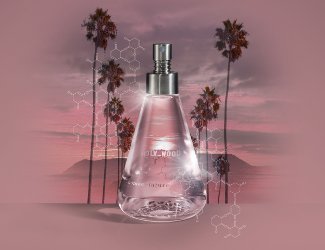
Niche line Nomenclature will launch Holy_wood, a new fragrance highlighting the synthetic note Clearwood, this fall.
The molecule: Clearwood® The very first fragrance ingredient designed through White Biotechnology, Clearwood® is the 21st century’s answer to patchouli. Developed in California for Firmenich, this sustainable, eco-friendly material is derived from the fermentation of sugar cane. Blurring the boundary between the natural and the man-made, the pioneering Clearwood® ushers in a new age for perfumery.
The Scent: Glam Wood In a neo-stalgic tribute to 1970s California, holy_wood celebrates both the New Age spiritual awakening of the era and the creative explosion of the New Hollywood cinema movement. Just as technical innovations allowed young directors like Scorsese or Altman to reinvent American cinematography, master perfumer Frank Voelkl uses cutting-edge materials to create a luminous modern version of the signature accord of that decade: rose and patchouli. Shorn of its musty facets, the latter reincarnates as the ethereal Clearwood®. Rose Petal Nature Print®, an airy “capture” of flower’s scent, breathes life into the classic note, sprinkled with sparkling pink pepper SFE*. Two floral divas, Bulgarian rose and jasmine sambac, add a touch of Golden-Age Hollywood glamour to the streamlined blend, on a bed of mystical sandalwood and luxurious suede. Turn on, tune in, waft out!
Nomenclature Holy_wood will be available in 100 ml Eau de Parfum.
(via press release)
Do we need a 21st Century answer to patchouli? I know it is everywhere, but I thought that meant note de jour, not endangered..
Almost nobody uses real patch anymore — consumers don’t like the musty bits. So when you see “patchouli” listed in notes, it’s almost always a synthetic like this or a molecular fraction. Which is more eco-friendly in the end, I have no idea, but “white biotechnology” is supposed to reduce waste, energy use, water use, etc.
Will just add that when I started as a perfumista, I didn’t like patchouli. Just around the time I started to appreciate it, it basically disappeared from perfumery. So the late 20th century answer was synthetics & molecular fractions, and the 21st century answer is to make synthetics in a more eco-friendly way?
Ah that makes more sense, thank you. In that case, this isn’t really that new then, just a tweak really. Explains the extrava-blurb!
I still don’t like patchouli much of the time. But what I wondered: was rose/patch really the signature accord of the 70s? I would have thought it a much more recent thing-90s or early 2000s? But maybe that’s niche and they mean mainstream?
I assumed they were talking about the “hippie” perfume oils?